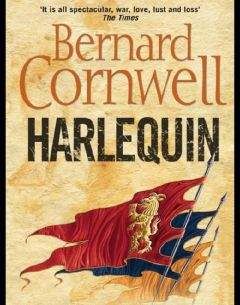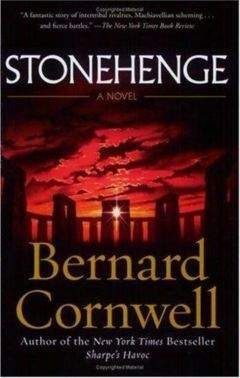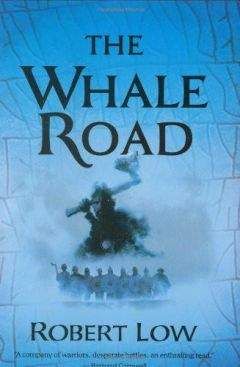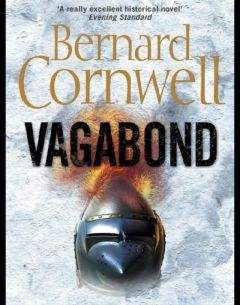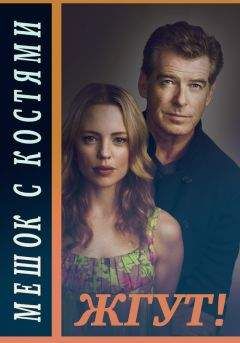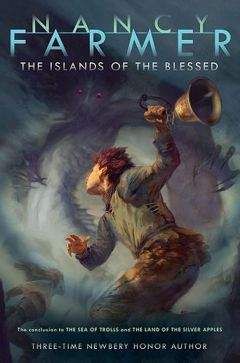Thomas strung the bow, took a white-fledged arrow from the bag, then looked at the three men beside the church. They were a long way off, but the black bow was as big a weapon as any ever made and the power in its yew belly was awesome. One of the men had a simple mail coat, another a plain black surcoat while the third had a red and green jacket over his mail shirt, and Thomas decided that the most gaudily dressed man must be the raid's leader and so he should die.
Thomas's left hand shook as he drew the bow. He was dry-mouthed, frightened. He knew he would shoot wild so he lowered his arm and released the cord's tension. Remember, he told himself, remember everything you have ever been taught. An archer does not aim, he kills. It is all in the head, in the arms, in the eyes, and killing a man is no different from shooting a hind. Draw and loose, that was all, and that was why he had practised for over ten years so that the act of drawing and loosing was as natural as breathing and as fluent as water flowing from a spring. Look and loose, do not think. Draw the string and let God guide the arrow. Smoke thickened above Hookton, and Thomas felt an immense anger surge like a black humour and he pushed his left hand for-ward and drew back with the right and he never took his eyes off the red and green coat. He drew till the cord was beside his right ear and then he loosed.
That was the first time Thomas of Hookton ever shot an arrow at a man and he knew it was good as soon as it leaped from the string, for the bow did not quiver. The arrow flew true and he watched it curve down, sinking from the hill to strike the green and red coat hard and deep. He let a second arrow fly, but the man in the mail coat dropped and scurried to the church porch while the third man picked up the lance and ran towards the beach where he was hidden by the smoke.
Thomas had twenty-one arrows left. One each for the holy trinity, he thought, and another for every year of his life, and that life was threatened, for a dozen crossbowmen were running towards the hill. He loosed a third arrow, then ran back through the hazels. He was suddenly exultant, filled with a sense of power and satisfaction. In that one instant, as the first arrow slid into the sky, he knew he wanted nothing more from life. He was an archer. Oxford could go to hell for all he cared, for Thomas had found his joy. He whooped with delight as he ran uphill. Crossbow bolts ripped through the hazel leaves and he noted that they made a deep, almost humming noise as they flew. Then he was over the hill's crest where he ran west for a few yards before doubling back to the summit. He paused long enough to loose another arrow, then turned and ran again. Thomas led the Genoese crossbowmen a dance of death, from hill to hedgerow, along paths he had known since childhood and like fools they followed him because their pride would not let them admit that they were beaten. But beaten they were, and two died before a trumpet sounded from the beach, summoning the raiders to their boats. The Genoese turned away then, stopping only to fetch the weapon, pouches, mail and coat of one of their dead, but Thomas killed another of them as they stooped over the body and this time the survivors just ran from him.
Thomas followed them down to the smoke-palled village. He ran past the alehouse, which was an inferno, and so to the shingle where the four boats were being shoved into the sea-reach. The sailors pushed off with long oars, then pulled out to sea. They towed the best three Hookton boats and left the others burning. The village was also burning, its thatch whirling into the sky in sparks and smoke and flaming scraps. Thomas shot one last useless arrow from the beach and watched it plunge into the sea short of the escaping raiders, then he turned away and went back through the stinking, burning, bloody village to the church, which was the only building the raiders had not set alight. The four companions of his vigil were dead, but Father Ralph still lived. He was sitting with his back against the altar. The bottom of his gown was dark with fresh blood and his long face was unnaturally white.
Thomas kneeled beside the priest. Father?"
Father Ralph opened his eyes and saw the bow. He grimaced, though whether in pain or disapproval, Thomas could not tell. Did you kill any of them, Thomas?“ the priest asked. Yes,” Thomas said, a lot."
Father Ralph grimaced and shuddered. Thomas reckoned the priest was one of the strongest men he had ever known, flawed perhaps, yet tough as a yew stave, but he was dying now and there was a whimper in his voice. You don't want to be a priest, do you, Thomas?" He asked the question in French, his mother tongue.
No," Thomas answered in the same language.
You're going to be a soldier,“ the priest said, like your grand-father.” He paused and whimpered as another bolt of pain ripped up from his belly. Thomas wanted to help him, but in truth there was nothing to be done. The Harlequin had run his sword into Father Ralph's belly and only God could save the priest now. I argued with my father,“ the dying man said, and he disowned me. He disinherited me and I have refused to acknowledge him from that day to this. But you, Thomas, you are like him. Very like him. And you have always argued with me.”
Yes, Father," Thomas said. He took his father's hand and the priest did not resist.
I loved your mother,“ Father Ralph said, and that was my sin, and you are the fruit of that sin. I thought if you became a priest you could rise above sin. It floods us, Thomas, it floods us. It is everywhere. I have seen the devil, Thomas, seen him with my own eyes and we must fight him. Only the Church can do that. Only the Church.” The tears flowed down his hollow unshaven cheeks. He looked past Thomas into the roof of the nave. They stole the lance," he said sadly.
I know."
My great-grandfather brought it from the Holy Land,“ Father Ralph said, and I stole it from my father and my brother's son stole it from us today.” He spoke softly. He will do evil with it. Bring it home, Thomas. Bring it home."
I will,“ Thomas promised him. Smoke began to thicken in the church. The raiders had not fired it, but the thatch was catching the flames from the burning scraps that filled the air. You say your brother's son stole it?” Thomas asked.
Your cousin," Father Ralph whispered, his eyes closed. The one dressed in black. He came and stole it,
Who is he?" Thomas asked.
Evil,“ Father Ralph said, evil.” He moaned and shook his head. Who is he?" Thomas insisted.
Calix meus inebrians.“ Father Ralph said in a voice scarce above a whisper. Thomas knew it was a line from a psalm and meant my cup makes me drunk” and he reckoned his father's mind was slip-ping as his soul hovered close to his body's end. Tell me who your father was!“ Thomas demanded. Tell me who I am, he wanted to say. Tell me who you are, Father. But Father Ralph's eyes were closed though he still gripped Thomas's hand hard. Father?” Thomas asked. The smoke dipped in the church and sifted out through the window Thomas had broken to make his escape. Father?"
But his father never spoke again. He died, and Thomas, who had fought against him all his life, wept like a child. At times he had been ashamed of his father, but in that smoky Easter morning he learned that he loved him. Most priests disowned their children, but Father Ralph had never hidden Thomas. He had let the world think what it wanted and he had freely confessed to being a man as well as a priest and if he sinned in loving his housekeeper then it was a sweet sin that he never denied even if he did say acts of contrition for it and feared that in the life hereafter he would be punished for it.
Thomas pulled his father away from the altar. He did not want the body to be burned when the roof collapsed. The silver chalice that Thomas had accidentally crushed was under the dead man's blood-soaked robe and Thomas pocketed it before dragging the corpse out into the graveyard. He lay his father beside the body of the man in the red and green coat and Thomas crouched there, weeping, knowing that he had failed in his first Easter vigil. The devil had stolen the Sacraments and Saint George's lance was gone and Hookton was dead.
At midday Sir Giles Marriott came to the village with a score of men armed with bows and billhooks. Sir Giles himself wore mail and carried a sword, but there was no enemy left to fight and Thomas was the only person left in the village.
Three yellow hawks on a blue field,“ Thomas told Sir Giles. Thomas?” Sir Giles asked, puzzled. He was the lord of the manor and an old man now, though in his time he had carried a lance against both the Scots and the French. He had been a good friend to Thomas's father, but he did not understand Thomas, whom he reckoned had grown wild as a wolf.
Three yellow hawks on a blue field,“ Thomas said vengefully, are the arms of the man who did this.” Were they the arms of his cousin? He did not know. There were so many questions left by his father.
I don't know whose badge that is,“ Sir Giles said, but I shall pray by God's bowels he screams in hell for this work.” There was nothing to be done until the fires had burned them-selves out, and only then could the bodies be dragged from the ashes. The burned dead had been blackened and grotesquely shrunk by the heat so that even the tallest men looked like children. The dead villagers were taken to the graveyard for a proper burial, but the bodies of the four crossbowmen were dragged down to the beach and there stripped naked.
Did you do this?" Sir Giles asked Thomas.
Yes, sir."
Then I thank you."
My first dead Frenchmen," Thomas said angrily.
No,“ Sir Giles said, and he lifted one of the men's tunics to show Thomas the badge of a green chalice embroidered on its sleeve. They're from Genoa,” Sir Giles said. The French hire them as cross-bowmen. I've killed a few in my time, but there are always more where they come from. You know what the badge is?“ A cup?”
Sir Giles shook his head. The Holy Grail. They reckon they have it in their cathedral. I'm told it's a great green thing, carved from an emerald and brought back from the crusades. I should like to see it one day."
Then I shall bring it to you,“ Thomas said bitterly, just as I shall bring back our lance.”
Sir Giles stared to sea. The raiders“ boats were long gone and there was nothing out there but the sun on the waves. Why would they come here?” he asked.
For the lance.
I doubt it was even real,“ Sir Giles said. He was red-faced, white-haired and heavy now. It was just an old spear, nothing more.” It's real,“ Thomas insisted, and that's why they came.” Sir Giles did not argue. Your father,“ he said instead, would have wanted you to finish your studies.”
My studies are done,“ Thomas said flatly. I'm going to France.” Sir Giles nodded. He reckoned the boy was far better suited to be a soldier than a priest. Will you go as an archer?“ he asked, looking at the great bow on Thomas's shoulder, or do you want to join my house and train to be a man-at-arms?” He half smiled. You're gently born, you know?"
I'm bastard born," Thomas insisted.
Your father was of good birth."
You know what family?" Thomas asked.
Sir Giles shrugged. He would never tell me, and if I pressed him he would just say that God was his father and his mother was the Church."
And my mother,“ Thomas said, was a priest's housekeeper and the daughter of a bowyer. I shall go to France as an archer.” There's more honour as a man-at-arms," Sir Giles observed, but Thomas did not want honour. He wanted revenge.
Sir Giles let him choose what he wanted from the enemy's dead and Thomas picked a mail coat, a pair of long boots, a knife, a sword, a belt and a helmet. It was all plain gear, but serviceable, and only the mail coat needed mending, for he had driven an arrow clean through its rings. Sir Giles said he owed Thomas's father money, which may or may not have been true, but he paid it to Thomas with the gift of a four-year-old gelding. You'll need a horse,“ he said, for nowadays all archers are mounted. Go to Dor-chester,” he advised Thomas, and like as not you'll find someone recruiting bowmen."
The Genoese corpses were beheaded and their bodies left to rot while their four heads were impaled on stakes and planted along the Hook's shingle ridge. The gulls fed on the dead men's eyes and pecked at their flesh until the heads were flensed down to bare bones that stared vacantly to the sea.
But Thomas did not see the skulls. He had gone across the water, taken his black bow and joined the wars.
PART ONE Brittany
It was winter. A cold morning wind blew from the sea bringing a sour salt smell and a spitting rain that would inevitably sap the power of the bowstrings if it did not let up.
What it is,“ Jake said, is a waste of goddamn time.” No one took any notice of him.
Could have stayed in Brest,“ Jake grumbled, been sitting by a fire. Drinking ale.”
Again he was ignored.
Funny name for a town,“ Sam said after a long while. Brest. I like it, though.” He looked at the archers. Maybe we'll see the Blackbird again?" he suggested.
Maybe she'll put a bolt through your tongue,“ Will Skeat growled, and do us all a favour.”
The Blackbird was a woman who fought from the town walls every time the army made an assault. She was young, had black hair, wore a black cloak and shot a crossbow. In the first assault, when Will Skeat's archers had been in the vanguard of the attack and had lost four men, they had been close enough to see the Blackbird clearly and they had all thought her beautiful, though after a winter campaign of failure, cold, mud and hunger, almost any woman looked beautiful. Still, there was something special about the Blackbird.
She doesn't load that crossbow herself," Sam said, unmoved by Skeat's surliness.
Of course she bloody doesn't,“ Jake said. There ain't a woman born that can crank a crossbow.”
Dozy Mary could,“ another man said. Got muscles like a bullock, she has.”
And she closes her eyes when she shoots,“ Sam said, still talking of the Blackbird. I noticed.”
That's because you weren't doing your goddamn job,“ Will Skeat snarled,'s o shut your mouth, Sam.”
Sam was the youngest of Skeat's men. He claimed to be eighteen, though he was really not sure because he had lost count. He was a draper's son, had a cherubic face, brown curls and a heart as dark as sin. He was a good archer though; no one could serve Will Skeat without being good.
Right, lads,“ Skeat said, make ready.”
He had seen the stir in the encampment behind them. The enemy would notice it soon and the church bells would ring the alarm and the town walls would fill with defenders armed with crossbows. The crossbows would rip their bolts into the attackers and Skeat's job today was to try to clear those crossbowmen off the wall with his arrows. Some chance, he thought sourly. The defenders would crouch behind their crenellations and so deny his men an opportu-nity to aim, and doubtless this assault would end as the five other attacks had finished, in failure.
It had been a whole campaign of failure. William Bohun, the Earl of Northampton, who led this small English army, had launched the winter expedition in hope of capturing a stronghold in northern Brittany, but the assault on Carhaix had been a humiliating failure, the defenders of Guingamp had laughed at the English, and the walls of Lannion had repulsed every attack. They had captured Treguler, but as that town had no walls it was not much of an achievement and no place to make a fortress. Now, at the bitter end of the year, with nothing better to do, the Earl's army had fetched up outside this small town, which was scarcely more than a walled village, but even this miserable place had defied the army. The Earl had launched attack after attack and all had been beaten back. The English had been met by a storm of crossbow bolts, the scaling ladders had been thrust from the ramparts and the defenders had exulted in each failure.
